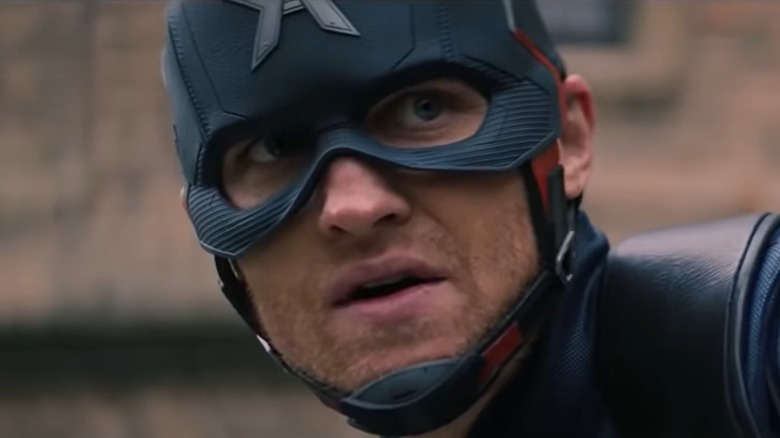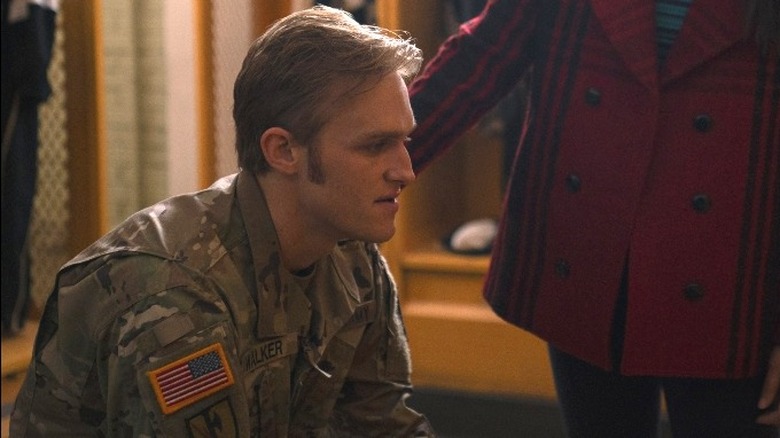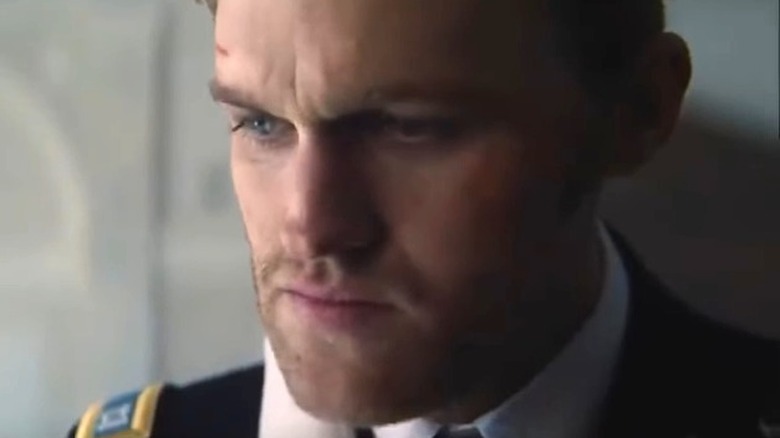Why John Walker From The Falcon And The Winter Soldier Actually Had A Point
From his debut on "The Falcon and the Winter Soldier," John Walker (Wyatt Russell) had big boots to fill. The decorated soldier is chosen by the government to assume the mantle of Captain America after Sam Wilson (Anthony Mackie) declines Steve Rogers' (Chris Evans) offer at the end of "Avengers: Endgame." With Sam, aka the Falcon, passing on the shield, Walker is left to pick up an impossible legacy, one wherein he will always be compared to the First Avenger.
Taking over from Steve is a daunting task. The first Captain America establishes a reputation as an American icon during "Captain America: The First Avenger" by taking on the Nazis' rogue scientific branch, Hydra. Cap later proves his heroism both with the Avengers and without, taking on Hydra once again in the 21st century as well as standing up to Thanos (Josh Brolin) when the Mad Titan extinguishes half of all life using the Infinity Stones.
It is fresh from the Blip that Walker becomes the new Captain America after Steve opts to remain in the past with Peggy Carter (Hayley Atwell). Perhaps expectedly, Walker almost immediately buckles under the pressure of living up to the sky-high standards set by Steve. But considering the circumstances, can Walker really be blamed for his actions on "The Falcon and the Winter Soldier"?
John Walker's best friend is murdered in front of him
Two sets of friendships mirror each other throughout "The Falcon and the Winter Soldier": Bucky Barnes (Sebastian Stan) and Sam Wilson, and John Walker and Lemar Hoskins, aka Battlestar (Clé Bennett). While Bucky struggles to make amends for his dark past as the Winter Soldier, Sam — after some squabbling — coaches him through it, becoming a supportive figure in the ex-soldier's life. Similarly, Lemar is the voice of reason for John. Until Lemar dies.
Episode 4, "The World Is Watching," sees Flag Smasher leader and super soldier Karli Morgenthau (Erin Kellyman) accidentally kill Lemar during a fight with Walker, Bucky, and Sam. The death of his best friend understandably triggers immense emotional pain for the future U.S. Agent. Until that point, Lemar and John had fought in numerous wars together, surviving countless battles and growing stronger from the experience. Walker's best friend dying in front of him sets off an emotional reaction, one that is amplified by the Super Soldier Serum.
When it comes down to the final fight during the finale, "One World, One People," Walker sets aside his pursuit of revenge against Karli to rescue a van full of people from certain death. Despite his flaws, Walker is capable of doing the right thing when the moment calls for it.
John Walker did what he was trained to do
John Walker is not perfect – he condescends to the Dora Milaje as well as Sam and Bucky. But he also does what he has been trained to do. Walker is a soldier first and foremost. Unlike Steve Rogers and Sam Wilson, who could be considered the MCU's perfect paragons of morality, Walker operates in more of a gray area.
In a 2021 interview with Entertainment Weekly, Wyatt Russell delved into the differences between Steve Rogers and John Walker. "What I thought was interesting about John is that Steve was a soldier from a different era," he explained. "The era of John is very different [from] the era of Steve. The type of military men who are going to Iraq and Afghanistan was different because the time was different ... You go in guns blazing first and ask questions later."
Walker is admittedly more of a follower than a leader like Cap. As he tells the council during his hearing in Episode 5, "Truth," he has done the job he was trained to do — and done it well. This pushes him further from Steve's ideals: Steve had no problem standing against the government during "Captain America: Civil War," thinking for himself rather than following orders. While these differences are what ultimately make Walker more suited to being U.S. Agent than Captain America, they are not as demonizing as some may think.


